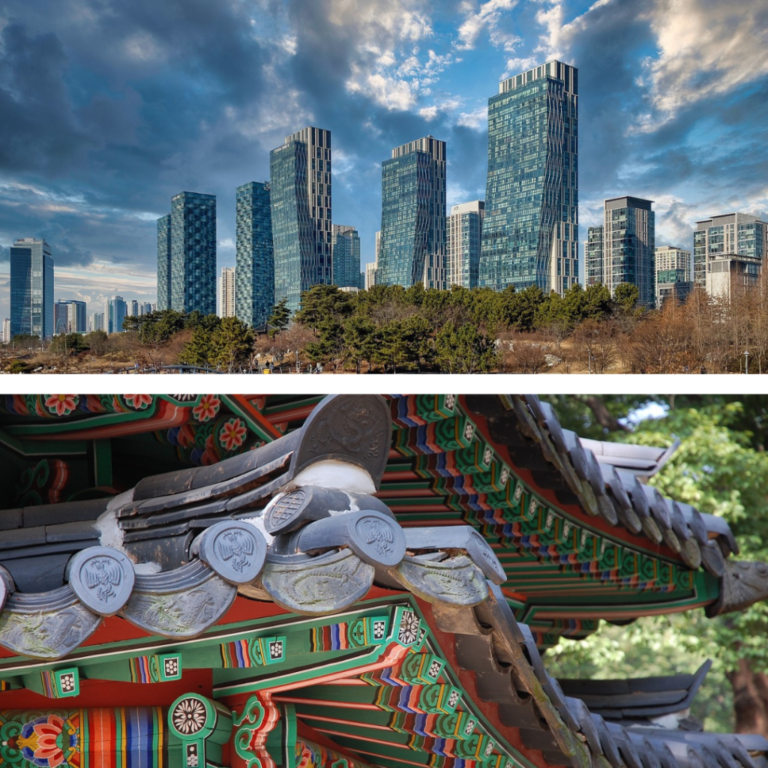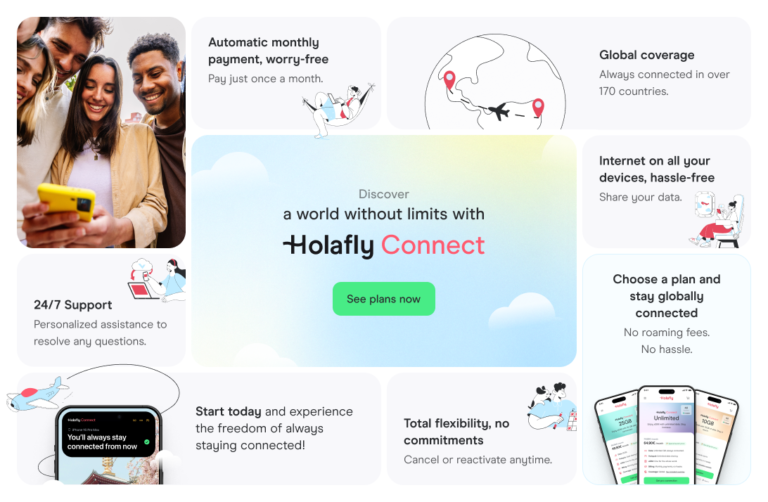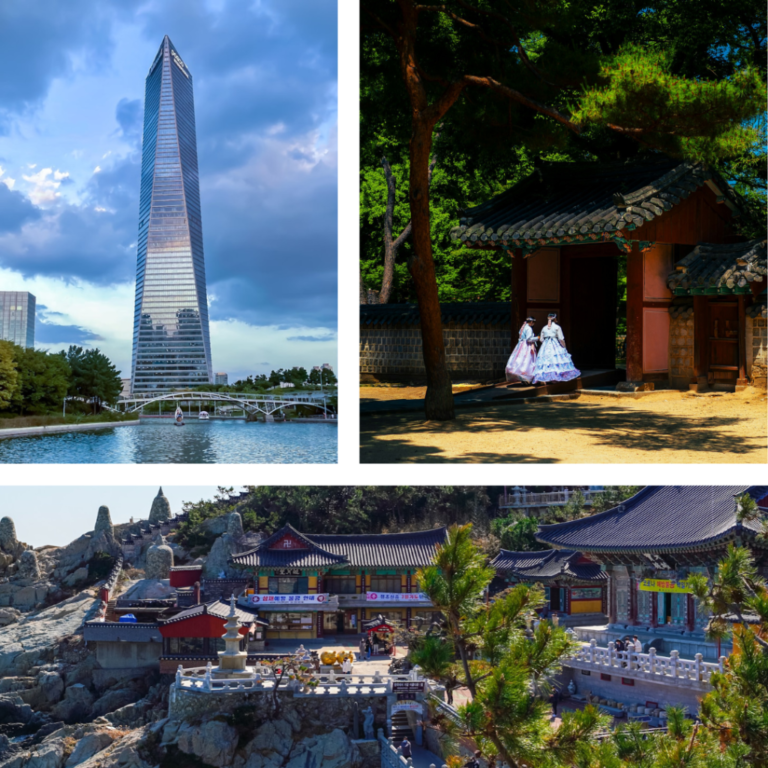Digital Nomads in South Korea: Work and Travel Guide
If you are planning to live and work as a digital nomad in South Korea, this is your guide! We give you valuable information to plan your stay in the country.
Have you ever thought about working as a digital nomad in South Korea? In case you didn’t know, this small country is one of the most developed in the world when it comes to technology and digital infrastructure, with fast and excellent internet connections. Both factors are very attractive to digital nomads. But that’s not all… Living in South Korea allows you to immerse yourself in its culture, while exploring cities such as Seoul (the country’s capital), whose perfect blend of modernity and tradition is particularly appealing. In addition, the proximity to China, Japan and Southeast Asia further broadens the horizon of work and the possibility of living incredible experiences.
In this guide we tell you everything you need to know about living and working as a digital nomad in South Korea: which are the best cities for this purpose, what taxes you have to pay, the type of visa you need to apply for, the main coworking spaces and much more. If you reach the end, you will have found valuable information that will help you plan your stay in this advanced country.
Advantages of being a digital nomad in South Korea
South Korea has positioned itself as a popular destination for digital nomads. There are many reasons for this: excellent connectivity, a modern and first-class infrastructure and a dynamic environment that combines tradition and technology. As we’ve said, the country offers some of the fastest internet speeds in the world, a key advantage for those working remotely. In addition, its vibrant cities, such as Seoul and Busan, have numerous coworking spaces and cosy cafés, ideal for maintaining productivity while enjoying their unique atmosphere.
Safety, efficient transport and rich cultural offerings are other strengths that make South Korea an attractive place for remote workers. From historic temples and mountains for the hiking enthusiast, to hip, tech-savvy neighbourhoods like Gangnam, South Korea offers an all-encompassing experience that combines quality of life and networking opportunities in a globalised environment. So if you’re looking for a place that blends innovation, tradition and a welcoming community, South Korea could be your next home base as a digital nomad.
If you still have any doubts about it, here we tell you more about the advantages of being a digital nomad in South Korea:
1. Connectivity and advanced technology
As you know, South Korea boasts one of the fastest and most accessible internet networks in the world. With average speeds exceeding 100 Mbps and free Wi-Fi available in many public spaces, it’s possible to work from virtually anywhere, whether it’s a café, a coworking space or your accommodation. Moreover, coworking facilities are well equipped, especially those in big cities such as Seoul, Busan and Daegu.
Also, remember that with your Holafly eSIM you will have unlimited connection and no roaming charges. And if you plan to work from Japan as well, the eSIM for Japan and Korea will be your ideal travel companion, giving you seamless connectivity and unlimited internet.
2. Networking opportunities and digital nomad communities
The digital nomad community in South Korea is growing steadily, especially in Seoul. The capital is the venue for many networking events, workshops and meetings organised in coworking spaces or cafés. These spaces are the ideal excuse to connect with professionals from all over the world and workers who are in the same situation as you. If you feel a bit lonely in your new country, you will be able to create bonds here, both professionally and personally. What’s more, this not only fosters cultural exchange, but can also open doors to new collaborations and projects.
3. Quality of life and security
Choosing a safe country with high quality of life standards is something most digital nomads want. In this respect, South Korea ranks as one of the safest countries in the world, with extremely low crime rates and an environment conducive to peaceful living.
In addition, public transport is efficient, clean and affordable, making it easy to get around the cities and explore their attractions. Standards of medical care are high, and both the public system and private services are well prepared to care for foreigners.
4. Vibrant and rich culture
South Korea is a destination where modernity and tradition coexist in fascinating ways. During your time in the country you can attend traditional festivals such as Chuseok (Korean Thanksgiving) and enjoy the K-pop and K-drama that dominate global pop culture. You can also explore Buddhist temples, sample delicious street food at local markets and participate in unique activities such as tea ceremonies.
5. Strategic location and regional connectivity
Located in the heart of Asia, South Korea is an ideal base for exploring other countries in the region. From here you can easily fly to destinations such as Japan, China, Thailand or Vietnam, broadening your horizons as a traveller and remote professional. Low-cost airlines, along with good rail and bus connectivity within the country, make travel easy and affordable.
6. Moderate cost of living
While South Korea may not be as cheap as other Asian destinations, the cost of living is reasonable compared to Western countries. Accommodation, food and transport are more affordable outside the big cities, and the quality you get for what you pay is usually high.
7. Adjustments for foreigners
South Korea has worked to become a more inclusive country towards foreigners. English menus, translated public transport signs and the willingness of locals to help make it a welcoming destination. In addition, the government has introduced specific visas that allow remote workers to reside legally, further facilitating the experience.
8. Tourist attractions
One of the nicest things about being a digital nomad is the fact that you can combine work with tourism. Getting out and exploring every country you visit as a remote worker will be one of the great rewards of this life choice. Fortunately, South Korea has many interesting places to discover.
The country’s natural wonders are a feast for the senses. From the breathtaking views of Jeju Island, with its pristine beaches and iconic Hallasan volcano, to national parks such as Seoraksan, where you can enjoy hiking trails through towering mountains and colourful forests.
Cities are another spectacle. Seoul, with its mix of futuristic skyscrapers and historic palaces like Gyeongbokgung, is the vibrant heart of Korea. Busan, famous for its beaches and Jagalchi fish market, combines coastal relaxation with bustling city life. For those seeking a quieter experience, Gyeongju, known as “the museum without walls”, captivates with its ancient temples and historical sites, while traditional villages such as Bukchon and Jeonju offer an authentic glimpse into the country’s rich cultural heritage.

Where to live and work as a digital nomad in South Korea
In South Korea you will find dynamic, cosmopolitan cities as well as small rural or mountainous towns where you can settle down to work. Here is a selection of the country’s best destinations for digital nomads:
1. Seoul
The country’s capital is one of the most technologically advanced cities in the world. Seoul is the perfect place for digital nomads looking for networking opportunities, vibrant city life and a wide range of cultural offerings.
- Advantages: ultra-fast internet connectivity, a huge number of cafés and coworking spaces, efficient public transport and a mix of tradition and modernity.
- Outstanding coworking spaces: FastFive, WeWork and FabLab.
- Recommended neighbourhoods:
- Hongdae: ideal for young creatives and entrepreneurs.
- Gangnam: perfect for those looking for a professional and luxurious atmosphere.
- Itaewon: popular with foreigners for its multicultural atmosphere.
2. Busan
South Korea’s second largest city offers a more relaxed atmosphere than Seoul, but with all the amenities needed to work as a digital nomad. Its proximity to the sea makes it an ideal place for those who enjoy the beach and nature.
- Advantages: lower cost of living than in Seoul, quiet atmosphere, and plenty to see and do for culture vultures and foodies alike.
- Recommended neighbourhoods:
- Haeundae: close to the beach, with many cafes and accommodation.
- Seomyeon: urban centre with coworking options such as Hive Arena.
3. Jeju
Jeju Island is a natural paradise combining scenic beauty and tranquillity, ideal for digital nomads seeking inspiration from nature.
- Advantages: pleasant climate, unique landscapes, and a slower pace of life.
- Outstanding coworking spaces: The Creative Economy Innovation Centre and several fast internet cafes in areas such as Seogwipo.
- Featured options: flat rentals close to the beach or in quiet rural areas.
4. Daegu
An emerging city for digital nomads, with a modern infrastructure and a very competitive cost of living.
- Advantages: lower accommodation and food costs, excellent connectivity and proximity to other major cities.
- Recommended neighbourhoods: Downtown Daegu, where coworking spaces and cafés are concentrated.
Main coworking spots for digital nomads in South Korea
South Korea has experienced a remarkable growth in coworking spaces, especially in its major cities, offering digital nomads and entrepreneurs collaborative and well-equipped environments.
1. Main coworking spots in Seoul:
- WeWork: with multiple locations in the city, including Gangnam and Gwanghwamun, WeWork offers flexible offices and a dynamic community. Its spaces are designed to foster collaboration and productivity.
- Seoul Startup Hub: located in Mapo-gu, this centre focuses on supporting startups and entrepreneurs. It has modern facilities, rest areas and event spaces, creating an environment conducive to innovation.
- FastFive: With several locations in Seoul, FastFive stands out for its modern, minimalist design. It offers optimised spaces for teamwork and a kitchen available 24 hours a day.
- Fab Lab: located in Jongno-gu, it is ideal for designers and multimedia artists. It offers access to equipment such as 3D printers and laser cutters.
2. Coworking in Busan
- The Company: this coworking space overlooks the sea and is located in Haeundae. It provides a relaxed atmosphere with modern facilities, ideal for professionals seeking inspiration by the sea.
- Space N: located in the Suyeong district, Space N offers flexible spaces and an active community. It is known for its networking events and workshops for entrepreneurs.
3. Coworking in Daegu
- Daegu Coworking Space: located in the city centre, this space offers modern facilities and a diverse community of professionals. It is ideal for those looking for a collaborative environment in Daegu.
- Open Space: located near Kyungpook University, Open Space is popular with students and startups. It offers affordable rates and a young and dynamic atmosphere.
These coworking spaces in South Korea not only provide quality infrastructure, but also foster active communities, facilitating networking and collaboration opportunities for digital nomads and entrepreneurs.

Which visa for digital nomads in South Korea?
One of the most important reasons for choosing South Korea to work remotely is its specially designed visa for digital nomads. We are talking about the Hallyu Remote Work Visa, which is aimed at those who wish to settle in the country while working for foreign companies or as freelancers. This visa was created with the specific objective of attracting such professionals and entrepreneurs to the country, as well as to boost tourism and promote cultural and professional interaction between South Korea and the rest of the world. And it has been a success, with thousands of digital nomads arriving in the country since its inception.
This visa allows you to reside in South Korea for an initial period of 12 months, with the option to renew it for up to two additional years. However, as with any procedure of this kind, you will have to meet a series of requirements in order to apply for your digital nomad visa. This guide tells you all about it: South Korea Digital Nomad Visa: How to Apply
Health insurance for digital nomads in South Korea
In addition to applying for a visa and choosing a city to settle in, you will need to have health insurance to cover you for any accidents or health problems you may have during your time in South Korea.
South Korea’s health care system is renowned for its efficiency and quality. The country implements a universal health insurance model known as National Health Insurance (NHI), which covers the majority of the population. But what about foreigners? Those employed by companies with more than five employees are entitled to workplace health insurance. Those who do not apply for NHI have the option of taking out private insurance. Leading companies include SafetyWing, World Nomads, IMG Global, Cigna Global. Each of them will allow you to save money on medical care which, by the way, is often quite expensive.
Digital nomads and taxes in South Korea
As anywhere else in the world, in South Korea you will have to pay taxes for working as a remote worker. The country’s tax system is characterised by its strictness, with taxes levied on both local citizens and foreigners, including digital nomads.
Taxation in South Korea for digital nomads depends on two main factors: tax residency status and length of stay in the country. If you spend more than 183 days in a tax year, you will be considered a tax resident, so you will be taxed on your global income, including income generated outside the country. If you stay for less than that time, you will be considered a non-resident for tax purposes and will only be taxed on income generated within South Korea.
On the other hand, if you work for clients or companies located outside Korea and stay less than 183 days, in most cases you will not have to pay local taxes. However, it is important to have clear evidence that your income comes from abroad. If you exceed 183 days, you may be obliged to file a tax return in South Korea and pay the corresponding tax according to the country’s scales.
Knowing and understanding the tax rules will allow you to enjoy your experience in the country with peace of mind and focus on what really matters: working and exploring this fascinating destination. So make sure you do your research beforehand, so you don’t get any surprises that impact your pocket.
Important: If you are a frequent traveler and want to stay connected without worrying about expensive roaming or looking for a new SIM at every destination, Holafly’s subscription plans are for you. With a single eSIM, enjoy internet in more than 170 countries for a fixed price and no surprises on your bill. travel without limits and connect easily and securely! 🚀🌍

What is daily life like in South Korea?
Living in South Korea as a digital nomad is an enriching experience thanks to the combination of advanced technology, a vibrant culture and an efficient transport system. Here we will explore the key aspects of daily life in the country:
1. Transport and mobility
In South Korea, you can drive using your international licence for a maximum of one year. If you plan to reside for a longer period, you will have to validate your licence at a local traffic office, a procedure that includes a simple written proof and a certified translation of your document.
Public transport, meanwhile, is one of the most efficient in the world, with cheap and fast options for getting around:
- Metro: present in cities such as Seoul and Busan, it is a reliable and affordable way to get around. Fares range from $0.90-1.1 each way.
- Buses: There are local and intercity buses, ideal for travel in and out of cities.
- Trains: KTX trains are perfect for long and fast journeys. A ticket from Seoul to Busan costs about $50.
- Taxis: although more expensive than public transport, they are convenient and safe. The initial fee is $2.80.
- Car sharing: services such as Kakao T and Tada offer private transport options via apps.
2. Financial management
Korea has banks accessible to foreigners, such as KB Kookmin Bank and Woori Bank, which offer English-language services and user-friendly applications. Or digital banks such as Kakao Bank, an ideal option for those who prefer mobile financial management.
At the same time, you will find ATMs in all parts of the country. The only thing to be aware of is that some may charge additional fees for international cards ($3 to $5 per transaction). To avoid extra costs, use ATMs at major banks.
It is advisable to have a KRW (South Korean Won) account for day-to-day expenses. Many banks allow temporary accounts to be opened with just a passport, although requirements vary.
3. Food: shopping and eating out
Korea offers a variety of supermarkets and shops for all needs. You have a choice of local and international chains such as E-mart and Lotte Mart. Traditional markets, such as Namdaemun Market in Seoul, are another attractive option for their colour, variety of products and prices. At the same time, shops like GS25 and CU are perfect for quick snacks and staples.
4. Leisure and free time
South Korea offers countless entertainment options. For the more sporty, there are gyms offering memberships from $50 per month, while outdoor enthusiasts can enjoy sports such as hiking in the nearby mountains.
Meanwhile, there is also no shortage of cultural options. In fact, you will be surprised at the many ways in which South Korean traditions and folklore can be discovered. Don’t miss the Seoul Lamp Festival or the Boryeong Mud Festival. Don’t miss the Gyeongbokgung Palace and the Hongdae cultural district, just to name a few.
5. Best time to visit South Korea
South Korea’s climate has four distinct seasons, so choosing when to visit is crucial. One of the most beautiful seasons is spring (March to May), ideal for the mild weather and cherry blossom festivals. Autumn is also very attractive (September to November), when temperatures are pleasant and the landscapes are tinged with ochre and reddish colours. Summer is hot and humid and perfect for trips to the beach. Winter, meanwhile, is particularly popular with skiing and snow sports enthusiasts.

Cost of living as a digital nomad in South Korea
Living in South Korea may be more expensive than in other Asian destinations, but it offers an exceptional quality of life. On average, a monthly budget of $1,200 to $1,800 per month will allow you to live comfortably.
Here is a breakdown of the main expenses:
- Accommodation: the cost of accommodation varies according to the city and type of accommodation. For example, a small flat in Seoul costs about $600 per month. Other cheaper options are co-living (from $400 with services included) and guesthouses, ideal for short stays (between $20 and $40 per night).
- Food: Eating out costs from $7 for a simple meal to $25 at mid-range restaurants. In supermarkets you will spend an average of around $200 a month, while in traditional markets you can save on fresh fruit, vegetables and meat.
- Transport: Metro and buses cost about $50 per month. KTX trains cost about $50-100 for longer trips, while taxis and carpools are moderately priced, depending on distance.
- Coworking spaces: options such as Punspace and Fastfive offer memberships from $100 per month, while there are free spaces for freelancers such as CAMP. Don’t forget that in many bars and libraries you can make use of free Wi-Fi and work in a warm and cosy atmosphere.
- Leisure: outdoor activities, except for excursions, are generally free so you can really make the most of them. If you plan to go to the gym, you can get a gym pass for about $50 a month, while a cinema ticket can cost about $10.
Digital Nomads in South Korea: frequently asked questions
This is not strictly necessary, as many people speak English in urban areas and coworking spaces are often adapted for foreigners. However, learning basic Korean phrases can improve your experience and make it easier to interact with locals. In addition, there are free apps and classes for foreigners who want to learn the language.
Yes, foreigners can open a bank account with a valid visa and passport. Recommended banks include KB Kookmin Bank and Woori Bank, which offer services in English. Digital banks such as Kakao Bank are also popular for their ease of use.
Not necessarily. A simple meal at a local restaurant costs $7 to $10, while a mid-range restaurant can cost $20 to $30 per person. You can also save by buying food at traditional markets and cooking at home.
You can search for accommodation on platforms such as Airbnb, Zigbang (local app) or on co-livings such as Hive Arena. Prices range from USD 400 per month for co-living options to USD 800 or more for private flats in larger cities such as Seoul.
Seoul is often chosen for its connectivity, cultural offerings and abundance of coworking spaces. Busan, being a coastal city, is ideal for those looking to combine work and beach. Other options include Incheon for its proximity to the international airport and Daegu, a cheaper and quieter city.





 Language
Language 


















 No results found
No results found


